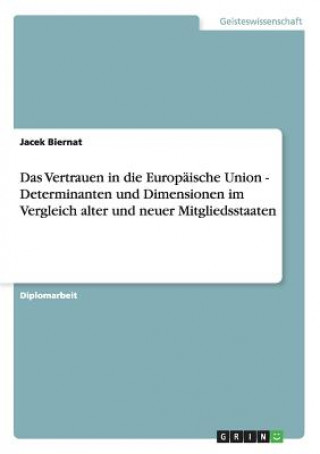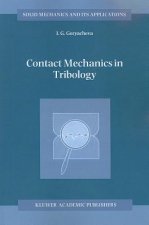
Kód: 01603695
Vertrauen in die Europaische Union - Determinanten und Dimensionen im Vergleich alter und neuer Mitgliedsstaaten
Autor Jacek Biernat
Diplomarbeit aus dem Jahr 2007 im Fachbereich Soziologie - Politische Soziologie, Majoritäten, Minoritäten, Note: 1,6, Europa-Universität Viadrina Frankfurt (Oder) (Frankfurter Institut für Transformationsstudien (FIT)), 127 Quell ... celý popis
- Jazyk:
 Němčina
Němčina - Vazba: Brožovaná
- Počet stran: 144
Nakladatelství: Grin Publishing, 2007
- Více informací o knize

Mohlo by se vám také líbit
-

Das Ende wird Nabucco heißen
370 Kč -

Esoterische Betrachtungen karmischer Zusammenhänge. Tl.3
427 Kč -

Kunst und Brot
406 Kč -

Nur fur Reiche!
658 Kč -

Clown Zippo und seine Zirkusabenteuer
340 Kč -

Countryside Game
246 Kč -

Contact Mechanics in Tribology
5060 Kč -

Forest Policy Analysis
6536 Kč -

Integer Partitions
6361 Kč -

Malý lexikon literárnych diel
66 Kč -

Cambridge IGCSE (R) Chemistry Coursebook with CD-ROM
1208 Kč -

Art of Planes
765 Kč -

Approximation Theory in the Central Limit Theorem
1665 Kč -

Comrade Ambassador
664 Kč
Dárkový poukaz: Radost zaručena
- Darujte poukaz v libovolné hodnotě a my se postaráme o zbytek.
- Poukaz se vztahuje na celou naši nabídku.
- Elektronický poukaz vytisknete z e-mailu a můžete ihned darovat.
- Platnost poukazu je 12 měsíců od data vystavení.
Více informací o knize Vertrauen in die Europaische Union - Determinanten und Dimensionen im Vergleich alter und neuer Mitgliedsstaaten
Nákupem získáte 221 bodů
 Anotace knihy
Anotace knihy
Diplomarbeit aus dem Jahr 2007 im Fachbereich Soziologie - Politische Soziologie, Majoritäten, Minoritäten, Note: 1,6, Europa-Universität Viadrina Frankfurt (Oder) (Frankfurter Institut für Transformationsstudien (FIT)), 127 Quellen im Literaturverzeichnis, Sprache: Deutsch, Abstract: Popular opinion of the European Union is becoming increasingly important for its legitimacy. This is due to the transfer of competencies from the member state to the European level, resulting in politicization. The purpose of this empirical study is to investigate citizens trust in the EU as a political entity. According to the theory of political support originally developed by David Easton, trust is a central orientation toward a political system. While rather diffuse in nature, it simultaneously depends considerably on specific attitudes. As for the research design, the position of trust diffuse or specific will first be identified with the instrument of the principal components analysis using the 1999 wave of the European Values Survey and the Eurobarometer 62 (2004). Secondly, twelve hypotheses on possible determinants of attitudes toward integration will be tested in a series of standardized multiple regressions run separately on fourteen countries.As the results show, trust in the EU is not well internalized. In many countries, it is impossible to clearly attribute it to one of the factors of political support. However, in Western und Southern Europe the EU seems to be perceived as simply another regime institution, hence a part of the domestic political system. In contrast, in Britain and Eastern Europe, a general European factor emerges showing that respondents separate the national political system from the foreign European sphere. Across Europe, the three necessary factors shaping trust in the EU are as follows: trust in national parliament, satisfaction with EU democracy, and trust in the social security system. Support of the nation state and satisfaction with its systemic performance boost the respondents trust in the EU. Thus, the EU is not viewed as an alternative to the domestic regime because the later is ineffective. However, the citizens also base their support for the EU depending on their understanding of democracy. Ultimately, few variables other than their political attitudes determine citizens trust in the EU. When all plausible economic and political explanations are accounted for, identity and let alone religion have but minor additional influence. The implication is that neither culture, identity, nor religion poses a long term threat to the consolidation of popular support, and the level of trust can be elevated if Europe and the member states deliver.
 Parametry knihy
Parametry knihy
2207 Kč
- Plný název: Vertrauen in die Europaische Union - Determinanten und Dimensionen im Vergleich alter und neuer Mitgliedsstaaten
- Autor: Jacek Biernat
- Jazyk:
 Němčina
Němčina - Vazba: Brožovaná
- Počet stran: 144
- EAN: 9783638836197
- ISBN: 3638836193
- ID: 01603695
- Nakladatelství: Grin Publishing
- Hmotnost: 195 g
- Rozměry: 210 × 148 × 9 mm
- Datum vydání: 27. October 2007
Oblíbené z jiného soudku
-

Amigurumis - soft and cosy!
433 Kč -

GND PAW Plüsch 15 cm Everest
320 Kč -

UNO No Mercy
531 Kč -

KLEINE PRINZ
129 Kč -

Trötsch Plüschpuppe Findus Kuscheltier
300 Kč -

Grammatik aktiv - Deutsch als Fremdsprache - 2. aktualisierte Ausgabe - A1-B1
463 Kč -

Harry Potter und der Stein der Weisen (Harry Potter 1)
262 Kč -

Amigurumis - small and sweet!
435 Kč -

Winnetou 1. Teil
1480 Kč -

Mein Kampf(German Language Edition)
652 Kč -

Mit Erfolg zum Goethe-Zertifikat C1
636 Kč -

Disney Rapunzel (Puzzle)
362 Kč -

Jujutsu Kaisen - Band 19
178 Kč -

Grammatik aktiv
608 Kč -

Triominos Classic
433 Kč -

Wir Kinder vom Bahnhof Zoo
262 Kč -

PAW PATROL Ryder Plüsch, 20 cm
299 Kč -

Avocado Smash
310 Kč -

GND PAW Plüsch 23 cm Skye
439 Kč -

GND PAW Plüsch 15cm Tracker
303 Kč -

Mit Erfolg zum Goethe C1. Testbuch + online
636 Kč -

Deutsch intensiv Wortschatz C1
449 Kč -

Schritte plus Neu 1
581 Kč -

Meine Reise durch Europa
320 Kč -

Duden 12+: Kennst du das? Meine bunte Kinderwelt (Würfel)
219 Kč -

Marble Rush - Ultimate Set XL100 E
1754 Kč -

Beste Freunde Arbeitsbuch A1.2 mit Audio-CD
260 Kč -

Momente A2.2: Kursbuch plus interaktive Version
222 Kč -

Momente A2.2. Arbeitsbuch plus interaktive Version
222 Kč -

GDH Deluxe Room Cakeys Küche
728 Kč -

Spektrum Deutsch A2+: Integriertes Kurs- und Arbeitsbuch für Deutsch als Fremdsprache
729 Kč -

Mein Kampf(German Language Edition)
888 Kč -

Im Westen nichts Neues
310 Kč -

Deutsch für clevere Kids - 5 Wörter am Tag
436 Kč -

Super! 2/A2: učebnice a pracovní sešit + CD zdarma
463 Kč -

Auto-Katalog 2024
332 Kč -

Tarot-Kartenset: Magic Soul Tarot
572 Kč -

Tempo, kleine Fische!
212 Kč -

My Rummy
546 Kč -

Projekt C1 neu: Lehrerbuch mit Audios online
1096 Kč -

Deutsch Großes Übungsbuch Wortschatz aktuell A2-C1. Buch
785 Kč -

Geheim-Codes
294 Kč -

Clever 4ever, Challenge Block, 12 Stück
146 Kč -

Insel der blauen Delphine
198 Kč -

Der Vorleser
310 Kč -

Alpe Adria Radweg
449 Kč -

Hitster - Summer Party
589 Kč -

Prüfungstraining DaF - C1
622 Kč -

Wizard
215 Kč
Osobní odběr Praha, Brno a 12903 dalších
Copyright ©2008-24 nejlevnejsi-knihy.cz Všechna práva vyhrazenaSoukromíCookies



 Vrácení do měsíce
Vrácení do měsíce 571 999 099 (8-15.30h)
571 999 099 (8-15.30h)